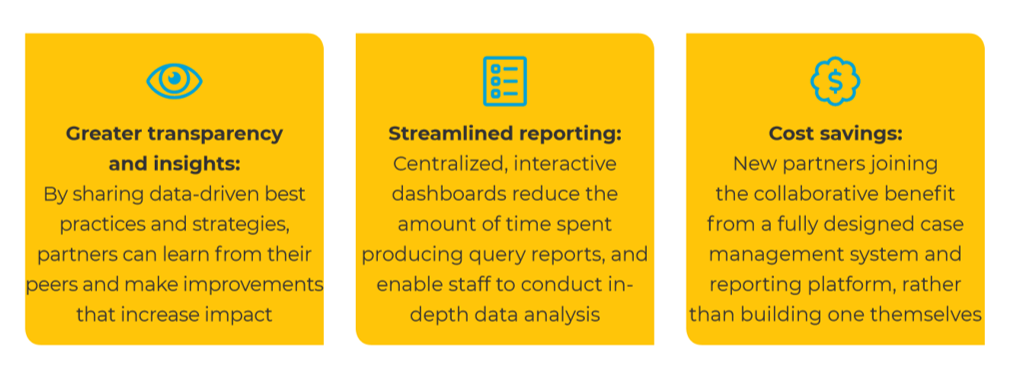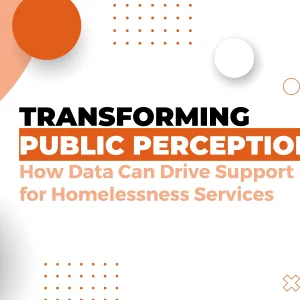Chicago Benchmarking Collaborative
The Chicago Benchmarking Collaborative (CBC) was launched in 2009 and is an innovative nonprofit collaborative that uses data to improve outcomes for more than 4,200 low-income individuals in Chicago.
Exponent Case Manager (ECM) has empowered CBC to easily create reporting dashboards that draw on data from across the Collaborative’s six members. In this case study, we will learn more about CBC’s innovative approach and how ECM helps CBC make a difference through data.
Increasing Impact Through Data
CDC comprises a diverse mixture of education and human services nonprofits that collaborate with low-income individuals throughout some of Chicago’s most underserved neighborhoods. Christopher House, a family of schools that provides a range of support services for their families, is the Collaborative’s Project Manager. The CBC’s goal is to increase the impact of Collaborative’s programs focused on low-income children and families by sharing data and effective practices.
The CBC identified three key triggers of success for their data Collaborative:
-
First, partners see each member’s value to the Collaborative and share a common vision to increase their impact by making data-informed program improvements that will be more likely to deliver on outcomes.
-
Second, leadership is most important in sponsoring change to organizational culture to become data-informed. They communicate the vision and expectations to staff, establish a sense of urgency for the work, and make resource commitments to ensure change happens successfully.
-
Lastly, there is a need for accurate data and a software platform to effectively evaluate programs, create reporting dashboards, and for learning groups to discuss how to improve based on data.
The Benefits of a Shared Approach to Data
CBC has identified several key benefits of a collaborative approach to data reporting and shared reporting dashboards. These include:
-
Greater transparency and insights: By sharing data-driven best practices and strategies, the Collaborative’s members can learn from their peers and make improvements that increase their impact.
-
Streamlined reporting: Centralized, interactive dashboards reduce the amount of time spent producing and querying reports, enabling the Collaborative’s staff to conduct in-depth data analysis.
-
Cost savings: New partners joining the Collaborative benefit from a fully designed case management system and reporting platform rather than building one themselves.
What Was CBC Aiming To Achieve in Its Move to ECM?
CBC identified a number of key outcomes it wanted to achieve by moving to ECM.
Need for a streamlined process for data collection
Before moving to ECM, some partners reported that data collection wasn’t user-friendly. The process for inputting data often involved multiple pages and navigation challenges. By streamlining the process, partners could spend more time analyzing data and making comparative insights.
Desire to improve data quality and empower individual partners
Higher quality data would lead to more valuable analysis and insights that Collaborative members could use to inform plans for data-driven improvements. With better quality data, including shared reporting dashboards, Collaborative members could also learn from each other and implement successful strategies and practices in their programs.
Need to reduce the amount of manual work required to aggregate data
Before implementing ECM, reports that detailed numbers and percentages were relatively easy for CBC to create. Still, data visuals had to be created outside of the CBC’s software by copying and pasting information into PowerPoint. This manual process was cumbersome, time-consuming, and introduced room for human error.
“We wanted a more streamlined process for data collection and easy to navigate pages for data entry, so that we could produce cross-agency reports on a set of common outcomes and outcome indicators that partners use for comparative insights. We now have a shared platform with interactive dashboards that are a huge timesaver, and that allow partners to drill down on specific data points within those outcome results.”– Traci Stanley, Director of Quality Assurance, Christopher House, and Project Manager, CBC
How CBC Implemented ECM
After the CBC decided to replace its existing solution, the organization issued an RFI to understand four vendors’ functionality, capabilities, and pricing. CBC then used the information provided by the vendors to complete a comparative analysis, supplemented by input from peer agencies.
The desire to have one shared platform that everybody could access ultimately led the CBC to select Salesforce and Exponent Case Management (ECM), an innovative Case Manamgnet solution for Salesforce. “The combination of the Salesforce platform and ECM would enable us to create dashboards and data visuals for our outcome results,” explains Traci, the project manager for the CBC. “We would gain the ability to easily aggregate those outcome results by different demographic types and results for students in specific neighborhoods.”
ECM’s Implementation Experts took time to understand CBC’s requirements. This involved a deep dive into the organization’s requirements, including the target population, assessments that needed tracking, and day-to-day activities of different functional roles.
“The discovery process was very thorough and captured our Collaborative needs, some of which were in alignment, whereas others were agency-specific,” explains Traci. From there, ECM’s experts designed and implemented ECM for CBC. This process was fully collaborative and enabled ECM’s implementation experts to solidify details about what would get built and for which programs. As a result, Traci says, “We went from having many different programs, each capturing a few participants, in our previous system to fewer, larger program buckets that capture more participants.”
What Impact Has ECM Had on CBC?
CBC is clear that ECM has had a significant impact on the Collaborative. These impacts include:
Simpler data capture
When doing an intake, partners using ECM now can capture all intake information and demographics in one place, providing a complete picture of a family. This efficient intake process saves valuable staff time. This time can be used for service delivery and to analyze data, look for trends, and determine ways to use the data to increase the CBC’s impact.
Streamlined reporting
The Collaborative can create detailed reports and reporting dashboards that contain easy-to-understand data visuals in one place, using ECM and its link to Einstein Analytics. “Einstein Analytics will take some of the mystery away from program staff who, in the past, have been looking at aggregate data reports that may show they’re not doing well in a certain area, but they can’t drill down to see which kids are struggling,” explains Traci.
By using ECM, Collaborative members have a greater ability to drill down into the data and access information for their own agency related to a specific program. “Having that information is crucial because each partner can individualize their approach in a program based on how specific kids are doing.” Thanks to ECM’s easy-to-use data dashboards, the Collaborative’s members also gain the ability to aggregate results in more meaningful reports to meet their unique needs.
Enhanced ability to consolidate multiple databases and ensure data integrity
Staff can now upload data from non-ECM users onto the Einstein Analytics shared platform and incorporate that data into dashboard reports for the Collaborative. The ability to be solution-agnostic when it comes to data sharing makes it easier for the Collaborative to recruit new partners. Data integrity is also better as manual work related to the creation of charts and visuals has been eliminated.
Increased cost savings and cost efficiencies
New members of the Collaborative benefit from design and configuration savings. If they choose to adopt ECM, they also benefit from a fully designed case management system and reporting platform, which can be configured to meet the needs of their individual programs. Additionally, cost efficiencies have been achieved as ECM’s experts can configure multiple systems in an uninterrupted period as a single project rather than as separate, standalone projects.
Einstein Analytics has also achieved cost savings, allowing Christopher House to build dashboards for multiple organizations that can log in and access their outcome reports.
“We are now in a position to help new partners get up and running and support them as we expand the Collaborative. The more partners we recruit, the bigger the data set that we have to benchmark with, which is exciting.” – Traci Stanley, Director of Quality Assurance, Christopher House, and Project Manager, CBC
Established effective practices
The Collaborative uses data provided by ECM’s reporting dashboards to inform decisions about establishing program practices and strategies. For example, rather than working in silos, collaborative members can now examine data and hold group discussions to explore what contributed to those results. Members can then determine which best practices can be shared and implemented in their individual organizations to increase their impact on the children, youth, and families in CBC’s community.
Improved quality of services
The data that ECM has empowered the Collaborative to collect and analyze seamlessly has enabled the Collaborative’s members to make programmatic changes and professional development. This has led to the Collaborative seeing better outcome results and an increase in the overall quality of their programs, which ultimately benefits students and families.
For example, as a result of comparing data using ECM, the Collaborative’s members identified early math as an area for improvement across all organizations. Christopher House then organized and led a six-month math professional development cohort for teachers from all CBC partner organizations. As a result, the average math score across all collaborating organizations increased by nearly 25 percent.
Increased transparency and insights
By using a standardized set of measures, Collaborative members have access to valuable benchmark data and can easily see how their program results stack up against those of other partners. In addition, sharing data, best practices, and strategies is a game-changer compared to partners’ past attempts to benchmark against their own data from the previous year.
How Could ECM Impact Your Organization?
The team at ECM count it as their privilege to help human services organizations make a bigger impact on their communities by empowering them to collect, use and analyze data easily, whether as individual organizations or as collaboratives like the CBC. Why not reach out to ECM’s experts to see how ECM could benefit your organization?






